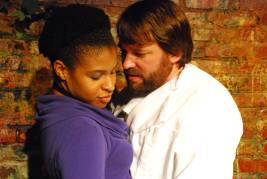
Playwright David J. Duman has taken his years of toiling in assorted San Francisco Bay Area restaurants and used them as food for laughter in Fishing, his sexy, spicy, fly-on-the-wall look at the staff and customers of a trendy seafood eatery, now getting its first Los Angeles production at Downtown L.A.’s Archway Studio/Theatre.
 Told in a series of three dozen scenes, some as long as several minutes, a few of them hardly more than seconds in length, Fishing introduces us to sassy, scruffy gay waiter Darren (Clayton Farris) and his lusty, busty best bud (and fellow server) Tamara (Chase McKenna); Sandra (Shani Tennyson), the restaurant’s intense, workaholic manager who’d rather be doing anything else but managing a restaurant; Thomas (Christopher W. Jones), the fish joint’s up-and-coming but not terribly people-pleasing chef; and Mark and Katie (Peter James Smith and Liz Heathcoat), a couple of food-obsessed young marrieds with a secret penchant for the kinky.
Told in a series of three dozen scenes, some as long as several minutes, a few of them hardly more than seconds in length, Fishing introduces us to sassy, scruffy gay waiter Darren (Clayton Farris) and his lusty, busty best bud (and fellow server) Tamara (Chase McKenna); Sandra (Shani Tennyson), the restaurant’s intense, workaholic manager who’d rather be doing anything else but managing a restaurant; Thomas (Christopher W. Jones), the fish joint’s up-and-coming but not terribly people-pleasing chef; and Mark and Katie (Peter James Smith and Liz Heathcoat), a couple of food-obsessed young marrieds with a secret penchant for the kinky.
As with any collection of vignettes, those in Fishing tend to be a hit-and-sort-of-miss bunch, though fortunately the former prevail, and never more so than when Mark and Katie are giving Darren their latest order (and driving him crazy in the process).
 Only someone with extensive restaurant experience could come up with lines as inspired as:
Only someone with extensive restaurant experience could come up with lines as inspired as:
KATIE: Your grilled squid—is that fried? DARREN: It’s grilled. KATIE: These salt cod croquettes—those sound good. DARREN: They’re excellent. Definitely salty, but very, very good. KATIE: Oh, they’re salty? DARREN: The salt cod croquettes? Yes.
Scenes between Darren and Tamara sparkle with the kind of zingy rapport that only a witty gay guy and his acerbic female best friend can produce, whether she’s offering him a twenty to ask “fat guy, mullet, chest hair” if he’s “packing nine inches in those polyester pants,” or he’s suggesting that she go flirt with Mark and Katie because she’s “really good at leading people on,” or the two of them are complaining about the “old people” at Tamara’s Table 4 who are splitting a Caesar and “that’s it?” “That’s it.”
 If Sandra and Thomas’s stories end up somewhat less compelling than those involving the aforementioned customers and staff, it’s probably that Duman is best when writing closer to home. (One can’t help wondering how much of Darren is a stand-in for the playwright.)
If Sandra and Thomas’s stories end up somewhat less compelling than those involving the aforementioned customers and staff, it’s probably that Duman is best when writing closer to home. (One can’t help wondering how much of Darren is a stand-in for the playwright.)
Still, if Fishing occasionally lags, there’s always another scene coming (often just seconds away), the entire mix making for a mostly tangy ninety or so minutes, intermission included.
 Director David Marmor obviously “gets” Duman’s sense of the absurd, and he elicits a bunch of sparkling performances from a cast kept always on their toes by more entrances and exits than most actors probably have to make in a half-dozen shows put together.
Director David Marmor obviously “gets” Duman’s sense of the absurd, and he elicits a bunch of sparkling performances from a cast kept always on their toes by more entrances and exits than most actors probably have to make in a half-dozen shows put together.
Tennyson and Jones are both amusing and real as Fishing’s odd-couple manager and chef, the development of their relationship from professional to personal an interestingly complex one to follow. Smith and Heathcoat, both terrific, have great fun skewering a couple of kinky, clueless “foodies.” Best of all are Farris and McKenna, stealing every scene they’re in with their fast tongues, wicked glances, and very real rapport,
With its coffee bar-like lobby leading into a yoga studio leading into a brick-walled blackbox stage area (which set designer Andy Lenigan has cleverly transformed into a section of Duman’s fictional dining establishment, the audience seated within touching distance of the cast), the Arts District’s Archway Studio/Theatre proves a particularly apt venue for a play like Fishing, though the lack of air conditioning makes for a mildly sweltering experience on a warm, humid August night.
Kristina Teves gets thumbs up for her lighting design, one which effectively focuses attention on one of the set’s two small dining tables, the reception area, or the kitchen counter.
Fishing’s frequent scene changes take place during a series of relatively brief blackouts. Still, each new blackout brings action and momentum to a halt and points out the production’s one big drawback—its missing sound design, one that might combine music (or muzak), ambient restaurant noises, overheard voices, etc., to set mood, tie scenes together, and not leave scenes and scene changes taking place in complete silence. A professional sound design is considered par for the course in a professional Los Angeles production, making its absence here all the more noticeable.
On a much more positive note, Fishing’s unbilled costume design (the cast’s own choices?) is a particularly fine one, not only matching the characters’ personalities to perfection, but indicating the passage of time through swiftly accomplished backstage costume changes.
Fishing is co-produced by Playwrights 6. Heather K. Phillips receives credit for graphic design and Corina Howell and Charlie Wright for photography. No one gets program credit as stage manager.
Anyone experienced in one the service industries will take particular pleasure in seeing it so cleverly spoofed (and paid affectionate homage to) in Fishing. As for those like this reviewer who’ve never waited on a table in their lives, the pleasure of discovery is likely to prove an equal treat.
Archway Studio/Theatre, 305 S. Hewitt St., Los Angeles
www.brownpapertickets.com/event/260879
–Steven Stanley
August 30, 2012


 Since 2007, Steven Stanley's StageSceneLA.com has spotlighted the best in Southern California theater via reviews, interviews, and its annual StageSceneLA Scenies.
Since 2007, Steven Stanley's StageSceneLA.com has spotlighted the best in Southern California theater via reviews, interviews, and its annual StageSceneLA Scenies.







 COPYRIGHT 2024 STEVEN STANLEY :: DESIGN BY
COPYRIGHT 2024 STEVEN STANLEY :: DESIGN BY